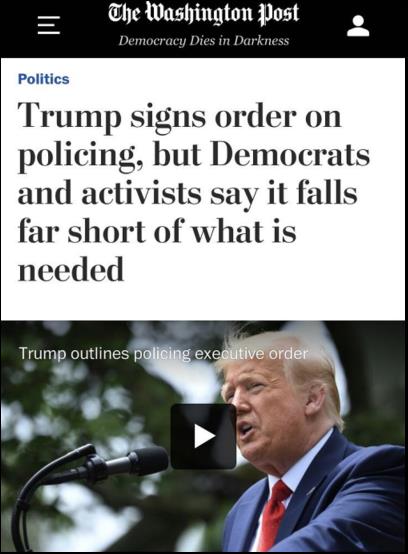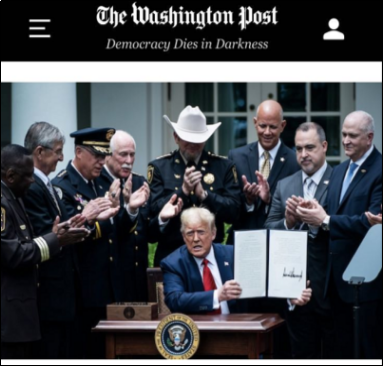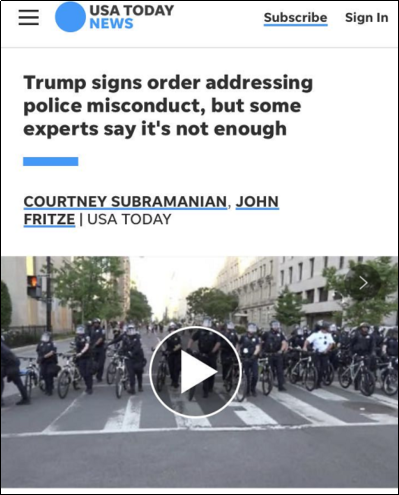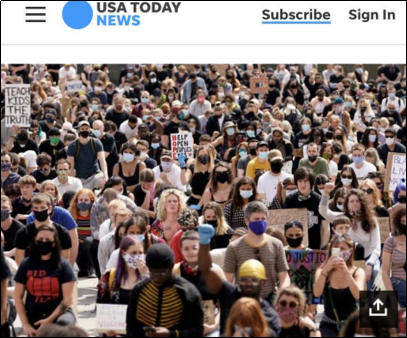Trump’s police reform has made it difficult for the United States, the police and the people to stand in opposition.
On June 16, local time, US President Trump signed an executive order to adjust the US police practice and qualification standards. The executive order made a statement on the large-scale protests by the American people against police brutality and racial discrimination in the past month, which meant that the government would "conform to public opinion" and make police reform.
However, the American media pointed out that the administrative order did not explicitly prohibit some violent law enforcement methods that the people strongly demanded to abolish, and the police system it proposed to improve law enforcement standards was actually "encouragement" rather than restraint. Public opinion believes that the reform of the executive order signed by Trump is weak, and it supports the reform in the open, but it is still a supporter of the police’s tough law enforcement in the dark.

The Washington Post pointed out that the administrative order of police reform signed by Trump is full of formalism.
The executive order is to encourage, not to require, the law enforcement of throat lock has not been abolished.
Trump told reporters that this executive order will help the police departments in the United States adopt the highest standards to serve their communities. The order stipulates "practice and qualification examination" and "information sharing of police behavior" to avoid employing police officers with bad records and to track down police officers who have committed misconduct in law enforcement.
However, the media pointed out that the executive order failed to clearly respond to some key issues, such as the standard and justification of the use of force mentioned in the executive order, but only "encouraged" its implementation; In addition, regarding the law enforcement means of throat lock, the administrative order has not explicitly abolished it, but indicated that it is generally unavailable, but it can be used in the case that "the law allows the use of lethal force".
The police surrounded Trump and called him "selfless" and "brave"
A number of media pointed out that although the signing of this executive order was caused by African-American Freud’s violent law enforcement by white police, the families of the victims were not invited to attend Trump’s signing ceremony. On the contrary, many military officers and police union personnel were surrounded by Trump. This seems to mean that Trump will never touch these law enforcement officers on which he relies, and how to reconcile the "social problems that deeply split the country" is still far away.
In the signing ceremony speech that day, after Trump mentioned the pain experienced by the relatives of the victims, he immediately began to praise the American police for being "brave and selfless" and said that "Americans all know that if there is no police, chaos will occur." The media pointed out that Trump’s signing of this executive order is full of formalism, and he obviously does not want to risk angering law enforcement departments, because these are an important part of his conservative political foundation.

The Washington Post pointed out that Trump "does not want to risk angering law enforcement because it is an important part of his conservative political foundation."
Serious problems minimize the police’s mental illness
Public opinion generally pointed out that Trump’s executive order made no mention of how to solve the systematic racism problems among law enforcement personnel and comprehensive policy changes. However, these issues are crucial to criminal justice reform. Kendall Thomas, a law professor at Columbia University, believes that Trump did not mention any commitment to serious changes in his executive order, but only focused on police training rather than community safety. Thomas believes that the purpose of Trump’s executive order is only to maintain the status quo, and the moderate reform in accordance with the new provisions of the executive order will only make the police force stronger.
Trump has always stressed that police misconduct is a "case" and the number is "very small". Rachel Bako, professor and vice president of criminal law at new york University Law School, believes that this shows that Trump fundamentally refused to admit the existence of the problem in the first place. Bako said that the entire law enforcement system is supportive of those police officers who use violence excessively. Trump has neglected this systematic problem, and the executive order has completely ignored or even mentioned the morbid psychology in the police system and the opposition between the police and the people.

USA-Today pointed out that Trump’s executive order made no mention of how to solve the systematic racism problem among law enforcement personnel and the need for comprehensive reform.
The reform of "thin soup and little water" must be intensified by administrative order.
On the day Trump signed the executive order, Schumer, the minority leader and Democrat of the Senate, immediately said that Trump’s executive order was "scanty soup and scanty water" and "unable to bring the comprehensive and meaningful changes and accountability required by the American people to American law enforcement agencies."
Earlier, the Police Justice Law submitted by the Democratic Party on June 8 called for a major reform of the police system, which explicitly required that police officers be prohibited from using frequently abused methods of law enforcement and arrest, such as lock throat and "no knocking at the door", and at the same time required local police departments to send data on the use of force to the federal government, and made a funding plan to allow state attorneys general to conduct independent procedures to investigate police misconduct or excessive law enforcement. In addition, the proposal will abolish the legal principle called "conditional immunity", and the police can no longer be exempted from civil litigation. These contents are not reflected in the newly signed administrative order.

USA-Today pointed out that there are a large number of people in the United States who can’t stand what the police have done.
David Kennedy, a professor of criminology at john jay College of the City University of new york, said that the current executive order is far from enough to make practical changes. Kennedy said: "People think it may be a little helpful, and now it is not enough to provide just a little help." Kennedy said that the emotions and resistance expressed by the American people in the past few weeks are unprecedented, and their attitude towards American law enforcement departments has also changed dramatically, which shows that a large number of people in the United States can no longer stand what the police are doing.